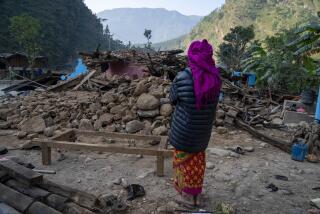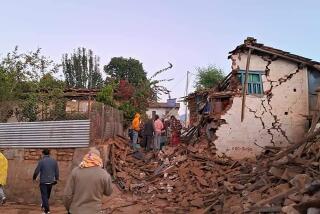Medical crisis in Nepal looms as unrest leads to fuel and drug shortages
- Share via
Reporting from KATMANDU, Nepal — Sanjay Lama moves in and out of the busy pharmacy at Tribhuvan University Teaching Hospital here in the capital looking for medicine prescribed for his 1-year-old son, Samrat. “It’s been almost a week, and I still can’t find a bottle of eardrops in any of the stores here. They say it’s out of stock,” Lama said as he clasped his son’s hand.
Although the doctors had yet to diagnose Samrat’s condition, Lama, 30, is worried about the boy’s frequent colds and fever amid worsening supply shortages. “He keeps falling ill, and I am afraid my son’s treatment will not move ahead smoothly if the current crisis deepens,” Lama said.
Unrest and violent protests in Nepal’s southern plains have gone on more than 100 days, causing crippling fuel shortages and a looming medical crisis as hospitals run out of supplies. Violence in key border points has led to a de facto blockade of the frontier with India.
“Our stock of medicine will barely last a week from now. If the supplies don’t resume we will have to start sending the patients back,” Prem Khadga, deputy director of the Tribhuvan hospital, said Sunday. According to Khadga, the patient flow has already diminished owing to the fuel shortage hindering mobility.
“We used to have around 2,000 patients visiting the hospital daily, but in the last few weeks that has decreased to 900 to 1,400,” Khadga said.
Although the hospital hasn’t reduced the number of surgeries performed, Khadga expressed concern about the depleted supply of syringes, essential drugs and blood bags. “The blood bags we have will reach their expiration date in 10 days. This crisis is worse than the aftermath of the April earthquake,” he says.
The Nepal Chemists and Druggists Assn. says that about 350 cargo trucks carrying medicine from India have been stranded at key border crossings; essential drugs are being airlifted to Katmandu. “Since last Thursday we have brought airlifted medicines worth $300,000 from India, but it will still take time to ease supply [shortages] until the cargo crosses the land border,” said Mrigendra Meher Shrestha, chairman of the organization.
Nepal imports 60% of its medicine from India.
Hours after protesters said they would allow trucks carrying medicine into Nepal, a gasoline bomb was thrown at a truck carrying $20,000 worth of medicine in Birgunj, 85 miles south of Katmandu.
Although there were no casualties, local authorities said most of the medicine was destroyed. Since Monday, ambulance operators in several districts in eastern Nepal have halted operations, citing security concerns.
Several hospitals including Tribhuvan have also been struggling with shortages of fuel to run the facilities.
“Our weekly operations have gone down from 30 to 20, and we may have to cut it down to 10 in the coming weeks because of our depleting stocks” of supplies, said Raamesh Koirala, senior surgeon at Shahid Gangalal National Heart Center in Katmandu.
Protests in Nepal’s southern plains escalated after passage of a long-awaited constitution in September. The charter is opposed by Nepalese living along the Indian border, who say it reduces their political representation.
More than 40 deaths have added further despair for a country still seeking to recover from a devastating earthquake. Since last Saturday, at least three people have been killed in violent clashes with the police in Saptari district, in eastern Nepal.
India has denied imposing a blockade, saying that trucks are not crossing into Nepal because of security fears surrounding the protests.
“Issues facing Nepal are political in nature and cannot be resolved by force. Causes underlying the present state of confrontation need to be addressed by the government of Nepal credibly and effectively,” Indian Foreign Ministry spokesman Vikas Swarup said at a recent briefing.
Landlocked Nepal relies heavily on the border crossing in Birgunj and the Indian port at Kolkata for trade. More than 700 trucks crossed the border checkpoint in Birgunj daily before the protests escalated in September.
Rai is a special correspondent.
More to Read
Sign up for Essential California
The most important California stories and recommendations in your inbox every morning.
You may occasionally receive promotional content from the Los Angeles Times.













